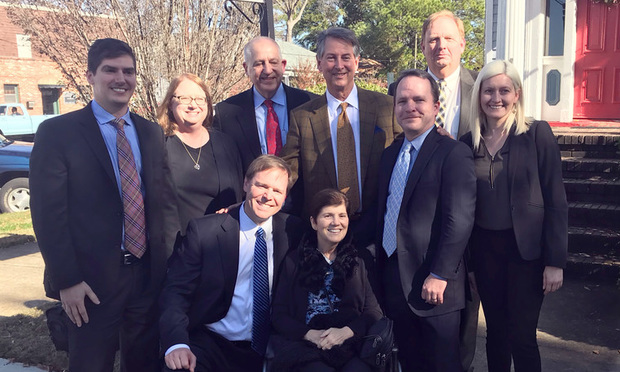Why a Hospital Agreed to Pay, Not Appeal, a $26M Med-Mal Verdict
“They didn't do it because they were feeling the Christmas spirit,” lead plaintiffs attorney Lloyd Bell said Wednesday.
December 14, 2017 at 03:23 PM
9 minute read

The most unusual development in a two-week medical-malpractice trial that wrapped up in Columbus this week may not have been the $26 million verdict.
After the jury came back, the lawyers reported they had worked out an agreement for the hospital to pay the full judgment and forgo an appeal.
“They didn't do it because they were feeling the Christmas spirit,” lead plaintiff's attorney Lloyd Bell of the Bell Law Firm said Wednesday.
The key appears to be that, after the verdict, Bell moved for attorney fees. The motion opened a new phase of the trial to determine if the hospital was guilty of bad faith. By then, Bell said, it was clear that the jury's sympathy was with his client, Sandra Williams, now blind and in a wheelchair because of oxygen deprivation during the medical crisis that was the subject of the trial in Muscogee County State Court. So, before Judge Benjamin Richardson could rule on the fees, Bell said, he and the hospital's lead defense counsel, Roger Sumrall of Bendin Sumrall & Ladner, worked out an agreement.
Sumrall could not be reached for comment.
Also encouraging the agreement, Bell said, was the presence of an appellate lawyer on the plaintiff's team, J. Darren Summerville of the Summerville Firm. “Darren did an excellent job of keeping me out of trouble,” Bell said. During the trial, the team was laying a foundation to defend a verdict against any appeal. “I'm confident that was one of the reasons the defense decided to settle,” Bell added.
Another defendant, Dr. Christopher Tidwell, was cleared at trial of wrongdoing. The jury apportioned 0 percent fault to Tidwell, a pulmonologist who attempted an intubation to clear the airway without general anesthesia because the anesthesiologist on call was not in the hospital. Tidwell was unable to place the tube due to the large hematoma, and the distorted and compressed airway, the pretrial order said. The anesthesiologist was able to successfully perform the intubation, but it took him 30 minutes to get there. During that time, Bell said, “Sandy was strangled,” the oxygen deprivation destroying her vision and mobility.
Tidwell was represented by Paul Weathington and Tracy Baker of Weathington McGrew.
“It was a strange situation in the courtroom when the verdict was read. Ms. Williams and her family were hugging each other but also hugging Dr. Tidwell,” Weathington said. “He's the one doctor who showed up immediately. He showed up within minutes of being called for a patient he knew nothing about. He determined he had to do something, but her airway was too swollen.”
Weathington may have gotten some help from Bell, who said he told the jury during openings that “Dr. Tidwell was handed a box of snakes” by the actions of others before he arrived.
Bell said both Weathington and Sumrall performed well during the trial. But Sumrall represented the “others” from the snake metaphor: St. Francis Hospital and its employees, including Dr. Erik Westerlund, who bore the brunt of the blame in testimony.
Westerlund is an orthopedic spine surgeon who was on call when Williams began having extreme pain in her throat three days after her Oct. 17 cervical fusion surgery, with an opening in the front of her neck. Her husband called at 1:30 a.m. to say his wife was unable to swallow and becoming disoriented. “Dr. Westerlund advised Mr. Williams to have his wife suck on popsicles, and consider going to the emergency room the following morning if her symptoms did not improve,” according to the plaintiff's summary in the consolidated pretrial order.
The husband didn't wait for morning but drove his wife to the hospital right away. They arrived at 2:30 a.m. The ER physician, Dr. John Corbin, determined she had a post-surgical cervical hemotoma: swelling and blood around the wound threatening to close the airway. Corbin sent her to the intensive care unit, where hospital rules say she should have been seen within two hours by the physician on call who admitted her, which was Westerlund. Instead, Williams was in the ICU for several hours without seeing a doctor, according to the pretrial order.
When the crisis was finally resolved, Williams did not wake up. She went into a coma for three weeks. When she did awake, she was left with permanent brain damage and dependent on caregivers for day-to-day life.
Later, her husband died of cancer, Bell said. During his illness, although she was at his side, she was not able to care for him as she normally would have because of her injuries, Bell said. He added he thought the jury was particularly moved by a video their son captured on a cellphone of the couple talking about their love and their life together, just before his death, in a “moment of clarity.”
The case is Williams v. Tidwell, No. SC14CV882.

The most unusual development in a two-week medical-malpractice trial that wrapped up in Columbus this week may not have been the $26 million verdict.
After the jury came back, the lawyers reported they had worked out an agreement for the hospital to pay the full judgment and forgo an appeal.
“They didn't do it because they were feeling the Christmas spirit,” lead plaintiff's attorney Lloyd Bell of the Bell Law Firm said Wednesday.
The key appears to be that, after the verdict, Bell moved for attorney fees. The motion opened a new phase of the trial to determine if the hospital was guilty of bad faith. By then, Bell said, it was clear that the jury's sympathy was with his client, Sandra Williams, now blind and in a wheelchair because of oxygen deprivation during the medical crisis that was the subject of the trial in Muscogee County State Court. So, before Judge Benjamin Richardson could rule on the fees, Bell said, he and the hospital's lead defense counsel, Roger Sumrall of Bendin Sumrall & Ladner, worked out an agreement.
Sumrall could not be reached for comment.
Also encouraging the agreement, Bell said, was the presence of an appellate lawyer on the plaintiff's team, J. Darren Summerville of the Summerville Firm. “Darren did an excellent job of keeping me out of trouble,” Bell said. During the trial, the team was laying a foundation to defend a verdict against any appeal. “I'm confident that was one of the reasons the defense decided to settle,” Bell added.
Another defendant, Dr. Christopher Tidwell, was cleared at trial of wrongdoing. The jury apportioned 0 percent fault to Tidwell, a pulmonologist who attempted an intubation to clear the airway without general anesthesia because the anesthesiologist on call was not in the hospital. Tidwell was unable to place the tube due to the large hematoma, and the distorted and compressed airway, the pretrial order said. The anesthesiologist was able to successfully perform the intubation, but it took him 30 minutes to get there. During that time, Bell said, “Sandy was strangled,” the oxygen deprivation destroying her vision and mobility.
Tidwell was represented by Paul Weathington and Tracy Baker of Weathington McGrew.
“It was a strange situation in the courtroom when the verdict was read. Ms. Williams and her family were hugging each other but also hugging Dr. Tidwell,” Weathington said. “He's the one doctor who showed up immediately. He showed up within minutes of being called for a patient he knew nothing about. He determined he had to do something, but her airway was too swollen.”
Weathington may have gotten some help from Bell, who said he told the jury during openings that “Dr. Tidwell was handed a box of snakes” by the actions of others before he arrived.
Bell said both Weathington and Sumrall performed well during the trial. But Sumrall represented the “others” from the snake metaphor: St. Francis Hospital and its employees, including Dr. Erik Westerlund, who bore the brunt of the blame in testimony.
Westerlund is an orthopedic spine surgeon who was on call when Williams began having extreme pain in her throat three days after her Oct. 17 cervical fusion surgery, with an opening in the front of her neck. Her husband called at 1:30 a.m. to say his wife was unable to swallow and becoming disoriented. “Dr. Westerlund advised Mr. Williams to have his wife suck on popsicles, and consider going to the emergency room the following morning if her symptoms did not improve,” according to the plaintiff's summary in the consolidated pretrial order.
The husband didn't wait for morning but drove his wife to the hospital right away. They arrived at 2:30 a.m. The ER physician, Dr. John Corbin, determined she had a post-surgical cervical hemotoma: swelling and blood around the wound threatening to close the airway. Corbin sent her to the intensive care unit, where hospital rules say she should have been seen within two hours by the physician on call who admitted her, which was Westerlund. Instead, Williams was in the ICU for several hours without seeing a doctor, according to the pretrial order.
When the crisis was finally resolved, Williams did not wake up. She went into a coma for three weeks. When she did awake, she was left with permanent brain damage and dependent on caregivers for day-to-day life.
Later, her husband died of cancer, Bell said. During his illness, although she was at his side, she was not able to care for him as she normally would have because of her injuries, Bell said. He added he thought the jury was particularly moved by a video their son captured on a cellphone of the couple talking about their love and their life together, just before his death, in a “moment of clarity.”
The case is Williams v. Tidwell, No. SC14CV882.
This content has been archived. It is available through our partners, LexisNexis® and Bloomberg Law.
To view this content, please continue to their sites.
Not a Lexis Subscriber?
Subscribe Now
Not a Bloomberg Law Subscriber?
Subscribe Now
NOT FOR REPRINT
© 2025 ALM Global, LLC, All Rights Reserved. Request academic re-use from www.copyright.com. All other uses, submit a request to [email protected]. For more information visit Asset & Logo Licensing.
You Might Like
View All
Fellows LaBriola LLP is Pleased to Announce that Alisha Goel Has Become Associated with The Firm
1 minute read


Trump RTO Mandates Won’t Disrupt Big Law Policies—But Client Expectations Might
6 minute readTrending Stories
- 1Who Are the Judges Assigned to Challenges to Trump’s Birthright Citizenship Order?
- 2Litigators of the Week: A Directed Verdict Win for Cisco in a West Texas Patent Case
- 3Litigator of the Week Runners-Up and Shout-Outs
- 4Womble Bond Becomes First Firm in UK to Roll Out AI Tool Firmwide
- 5Will a Market Dominated by Small- to Mid-Cap Deals Give Rise to a Dark Horse US Firm in China?
Who Got The Work
J. Brugh Lower of Gibbons has entered an appearance for industrial equipment supplier Devco Corporation in a pending trademark infringement lawsuit. The suit, accusing the defendant of selling knock-off Graco products, was filed Dec. 18 in New Jersey District Court by Rivkin Radler on behalf of Graco Inc. and Graco Minnesota. The case, assigned to U.S. District Judge Zahid N. Quraishi, is 3:24-cv-11294, Graco Inc. et al v. Devco Corporation.
Who Got The Work
Rebecca Maller-Stein and Kent A. Yalowitz of Arnold & Porter Kaye Scholer have entered their appearances for Hanaco Venture Capital and its executives, Lior Prosor and David Frankel, in a pending securities lawsuit. The action, filed on Dec. 24 in New York Southern District Court by Zell, Aron & Co. on behalf of Goldeneye Advisors, accuses the defendants of negligently and fraudulently managing the plaintiff's $1 million investment. The case, assigned to U.S. District Judge Vernon S. Broderick, is 1:24-cv-09918, Goldeneye Advisors, LLC v. Hanaco Venture Capital, Ltd. et al.
Who Got The Work
Attorneys from A&O Shearman has stepped in as defense counsel for Toronto-Dominion Bank and other defendants in a pending securities class action. The suit, filed Dec. 11 in New York Southern District Court by Bleichmar Fonti & Auld, accuses the defendants of concealing the bank's 'pervasive' deficiencies in regards to its compliance with the Bank Secrecy Act and the quality of its anti-money laundering controls. The case, assigned to U.S. District Judge Arun Subramanian, is 1:24-cv-09445, Gonzalez v. The Toronto-Dominion Bank et al.
Who Got The Work
Crown Castle International, a Pennsylvania company providing shared communications infrastructure, has turned to Luke D. Wolf of Gordon Rees Scully Mansukhani to fend off a pending breach-of-contract lawsuit. The court action, filed Nov. 25 in Michigan Eastern District Court by Hooper Hathaway PC on behalf of The Town Residences LLC, accuses Crown Castle of failing to transfer approximately $30,000 in utility payments from T-Mobile in breach of a roof-top lease and assignment agreement. The case, assigned to U.S. District Judge Susan K. Declercq, is 2:24-cv-13131, The Town Residences LLC v. T-Mobile US, Inc. et al.
Who Got The Work
Wilfred P. Coronato and Daniel M. Schwartz of McCarter & English have stepped in as defense counsel to Electrolux Home Products Inc. in a pending product liability lawsuit. The court action, filed Nov. 26 in New York Eastern District Court by Poulos Lopiccolo PC and Nagel Rice LLP on behalf of David Stern, alleges that the defendant's refrigerators’ drawers and shelving repeatedly break and fall apart within months after purchase. The case, assigned to U.S. District Judge Joan M. Azrack, is 2:24-cv-08204, Stern v. Electrolux Home Products, Inc.
Featured Firms
Law Offices of Gary Martin Hays & Associates, P.C.
(470) 294-1674
Law Offices of Mark E. Salomone
(857) 444-6468
Smith & Hassler
(713) 739-1250






